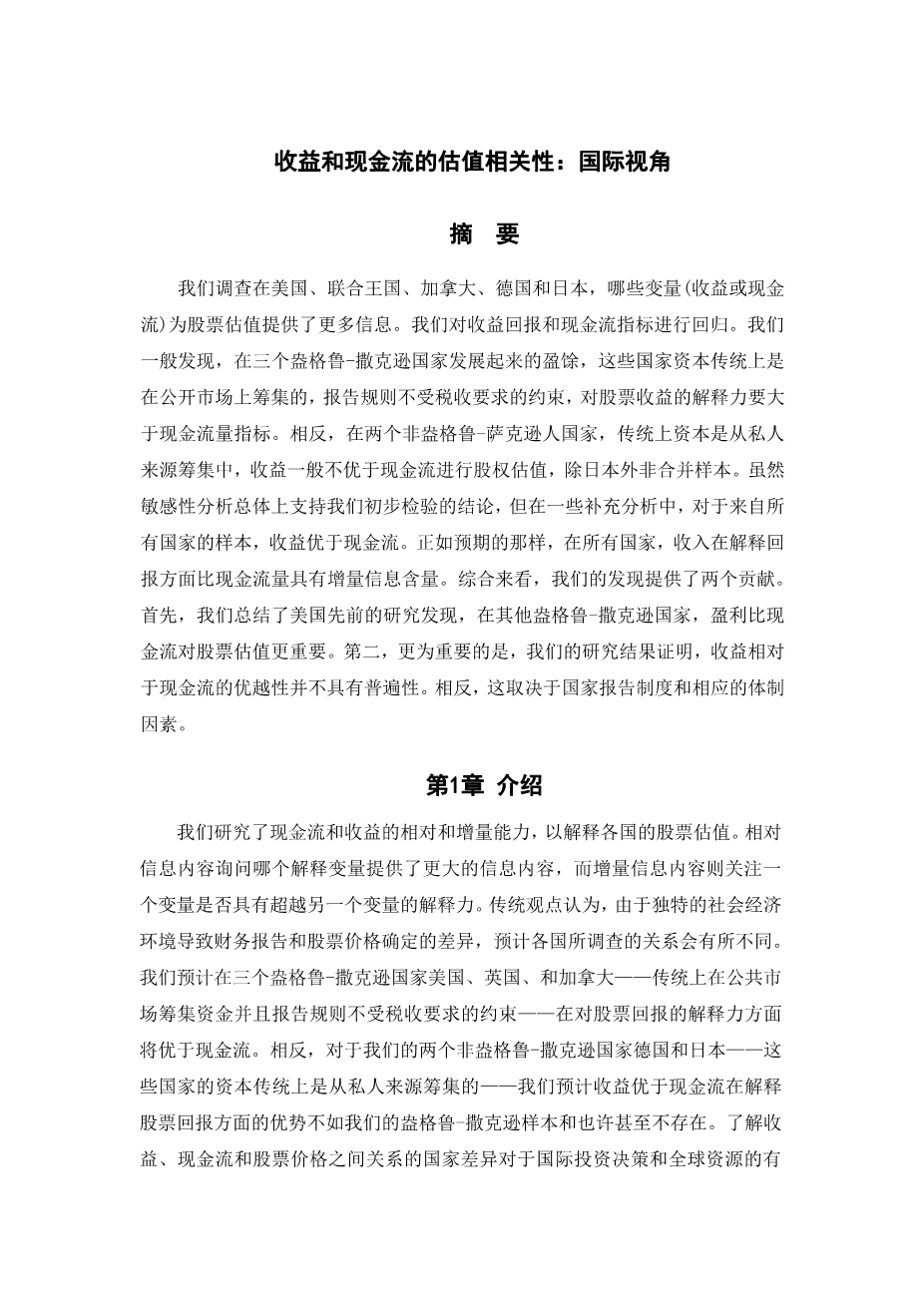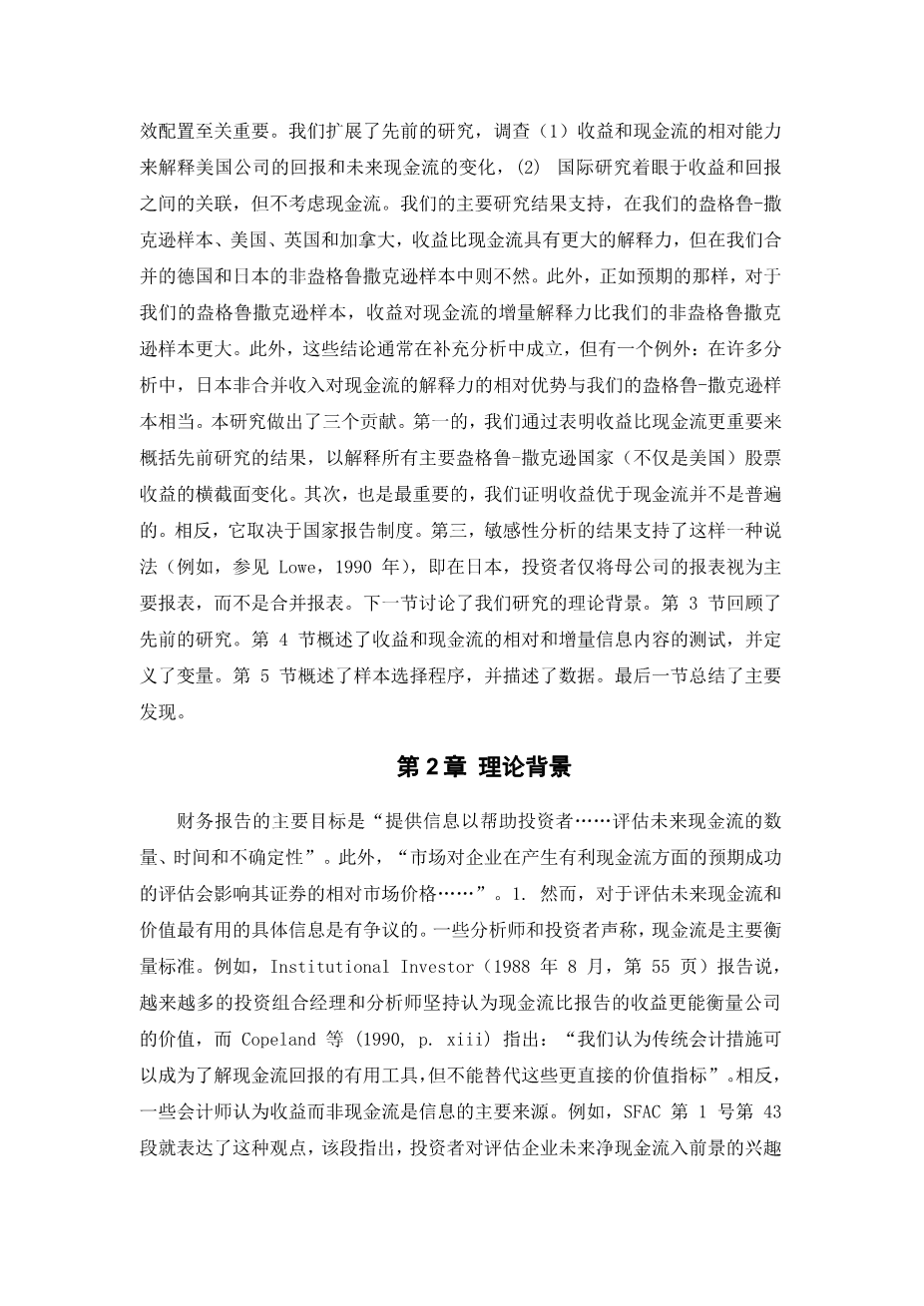The Valuation-relevance of Earnings and Cash Flows:
an International Perspective
Abstract
We investigate which variable, earnings or cash flows, provides greater information for equity valuation within the United States, the United Kingdom, Canada, Germany, and Japan. We regress returns on earnings and cash flow metrics. We generally find earnings developed in three Anglo-Saxon countries—where capital is traditionally raised in public markets and reporting rules are unencumbered by taxation requirements—to have greater explanatory power for stock returns than cash flow metrics. Conversely, in two non-AngloSaxon countries—where capital is traditionally raised from private sources—earnings are generally not superior to cash flows for equity valuation, except in Japan, non-consolidated sample. While sensitivity analyses generally support the conclusions of our primary tests, in some of the additional analyses, earnings were superior to cash flows for samples from all countries. As expected, in all countries earnings have incremental information content over cash flows in explaining returns. Collectively, our findings provide two contributions. First, we generalize the findings of prior US research by showing that earnings are more important than cash flows for equity valuation in other Anglo-Saxon countries. Second and more importantly, our findings demonstrate that the superiority of earnings over cash flows is not universal. Rather, it depends on the national reporting regime and attendant institutional factors
1. Introduction
We examine the relative and incremental abilities of cash flows and earnings to explain equity valuation across countries. Relative information content asks which explanatory variable provides greater information content, whereas incremental information content concerns whether one variable has explanatory power beyond the other. Conventional wisdom suggests that the relations investigated are expected to differ among countries due to unique socio-economic environments that result in differences in financial reporting and determination of stock prices. We expect that earnings developed in the three Anglo-Saxon countries, United States, United Kingdom, and Canada—where capital is traditionally raised in public markets and reporting rules are unencumbered by taxation requirements— will be superior to cash flows in their explanatory power for stock returns. Conversely, for our two non-Anglo-Saxon countries, Germany and Japan— where capital is traditionally raised from private sources—we expect the superiority of earnings over cash flows in explaining stock returns to be less pronounced than in our Anglo-Saxon samples and perhaps even nonexistent. Understanding national differences in relations among earnings, cash flows, and stock prices is critical to international investment decisions and efficient allocation of global resources. We extend previous research that investigates (1) relative abilities of earnings and cash flows to explain variations in returns and future cash flows of US firms, and (2) international research that looks at the association between earnings and returns, but does not consider cash flows. Our primary findings support that earnings have greater explanatory power than cash flows in our Anglo-Saxon samples, US, UK, and Canada, but not in our non-Anglo-Saxon samples of Germany and Japan consolidated. Also, as expected, the incremental explanatory power of earnings over cash flows is greater for our Anglo-Saxon samples over our non-Anglo Saxon samples. Furthermore, these conclusions generally hold up in supplementary analyses undertaken with one exception: in many of the analyses the relative superiority in the explanatory power of earnings over cash flows in Japan non-consolidated is comparable to our Anglo-Saxon samples. This study makes three contributions. First, we generalize findings of prior research by showing that earnings are more important than cash flows for explaining cross-sectional variation in stock returns in all major Anglo-Saxon countries, not only in the US. Second, and most importantly, we demonstrate that the superiority of earnings over cash flows is not universal. Rather, it depends on the national reporting regime. Third, results from the sensitivity analyses support the claim (see e.g., Lowe, 1990) that in Japan investors perceive parent company only statements, not the consolidated statements, the primary statements. The next section discusses the theoretical background underlying our study. Section 3 reviews prior research. Section 4 outlines the tests for the relative and incremental information content of earnings and cash flows, and defines the variables. Section 5 outlines the sample selection procedure, and describes the data. Section 6 reports the findings as well as the results of sensitivity analyses. The final section summarizes the main findings.
2. Theoretical Background
A primary objective of financial reporting is to “provide information to help investors hellip; to assess the amounts, timing and uncertainty of future cash flows”. Further, “The marketrsquo;s assessment of an enterprisersquo;s expected success in generating favorable cash flows affects the relative market prices of its securitieshellip;”.1 However, the specific information most useful for assessing future cash flows and value is controversial. Some analysts and investors claim that cash flows are the primary measures. For example, Institutional Investor (August 1988, p. 55) reports that a growing number of portfolio managers and analysts insist that cash flow is a more meaningful measure of a companyrsquo;s value than reported earnings, and Copeland et al. (1990, p. xiii) states: “We make the case that traditional accounting measures can be useful tools for understanding cash flow returns, but are no substitute for these more direct indicators
剩余内容已隐藏,支付完成后下载完整资料
英语译文共 13 页,剩余内容已隐藏,支付完成后下载完整资料
资料编号:[589249],资料为PDF文档或Word文档,PDF文档可免费转换为Word
课题毕业论文、外文翻译、任务书、文献综述、开题报告、程序设计、图纸设计等资料可联系客服协助查找。




